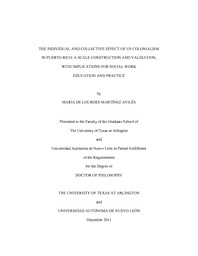
ATTENTION: The works hosted here are being migrated to a new repository that will consolidate resources, improve discoverability, and better show UTA's research impact on the global community. We will update authors as the migration progresses. Please see MavMatrix for more information.
Show simple item record
| dc.contributor.author | Martinez Aviles, Maria De Lourdes | en_US |
| dc.date.accessioned | 2012-04-11T20:55:18Z | |
| dc.date.available | 2012-04-11T20:55:18Z | |
| dc.date.issued | 2012-04-11 | |
| dc.date.submitted | January 2011 | en_US |
| dc.identifier.other | DISS-11521 | en_US |
| dc.identifier.uri | http://hdl.handle.net/10106/9545 | |
| dc.description.abstract | "Understanding the individual and collective psychology of the people of Puerto Rico requires an understanding of both the history of its colonialism and the U.S. laws that have helped shaped the social world of the Puerto Rican people, in the United States and in the colony itself"(Rivera Ramos, 2001, p. 4). This research presents theoretical and empirical support for the notion that colonialism is an important current issue, and so are its broad psychosocial effects. It sustains the concept that colonialism is a relevant and unresolved subject matter for Puerto Ricans and an important issue to be revised and debated by social work professionals and scholars. An initial review of the research literature made it evident that there is an absence of any kind of instrument to measure Puerto Ricans' internalized colonialism or colonial mentality. The Colonialism Scale for Puerto Ricans (CSPR) is the instrument developed by this investigator on her attempt to measure the concept of Puerto Rican's internalized colonialism. This scale rests on the premise that attitudes are made up of cognitive, affective and behavioral rudiments. The scale was designed following a Likert's summated rating method (Aiken, 1996; Likert, 1932). A total of 249 subjects were used to test the CSPR. The majority were females, with an age distribution ranging from 18 to 80 years of age, and a fairly high level of education. The original set of items was submitted to Exploratory Factor Analysis test with Principal Axis Factoring extraction. A Promax rotation suggested three factors; factor 1 consisting of eleven out of the fifteen items, and factor 2 and 3 consisting of two items each. After theoretical evaluation of the factors they were labeled as follows: Factor 1 = Colonial Discourse, Factor 2 = Idea of Colonial Resistance and Factor 3 = Language Identity. The factors' loading ranged from .555 to .901 with a cumulative percent of variance of 64.63%, and a residual of 12%. Cronbach's alpha for the CSPR = 89.8. The CSPR is now the instrument available to quantitatively measure the degree of internalized colonialism among Puerto Rican adults. Implications for further research and social work education and practice are discussed. | en_US |
| dc.description.sponsorship | Elliott, Doreen | en_US |
| dc.language.iso | en | en_US |
| dc.publisher | Social Work | en_US |
| dc.title | The Individual And Collective Effect Of US Colonialism In Puerto Rico: A Scale Construction And Validation, With Implications For Social Work Education And Practice | en_US |
| dc.type | Ph.D. | en_US |
| dc.contributor.committeeChair | Elliott, Doreen | en_US |
| dc.degree.department | Social Work | en_US |
| dc.degree.discipline | Social Work | en_US |
| dc.degree.grantor | University of Texas at Arlington | en_US |
| dc.degree.level | doctoral | en_US |
| dc.degree.name | Ph.D. | en_US |
Files in this item
- Name:
- MartinezAviles_uta_2502D_11521.pdf
- Size:
- 1.446Mb
- Format:
- PDF
This item appears in the following Collection(s)
Show simple item record


